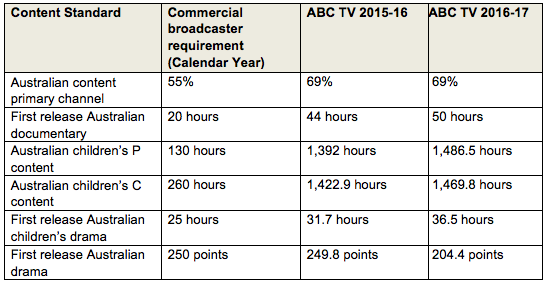The ABC has dismissed calls from FTA broadcasters to serve as the sole broadcaster of children’s content.
The ABC has strongly rejected the commercial free-to-air broadcasters’ demands that it restrict its role to providing programming which they cannot or will not provide.
In its submission to the Australian and Children’s Screen Content Review the ABC also rebuffed calls by Screen Producers Australia (SPA) to extend commercial quotas to public broadcasters.
In addition, the ABC opposed proposals by SPA, the Australian Directors’ Guild and MEAA to introduce local content obligations for SVOD platforms.
And it dismissed calls by Free TV Australia for the ABC to serve as the sole provider of children’s content.
“The ABC rejects any suggestion that its only role is to provide services that commercial broadcasters cannot or will not provide,” it says.
“The ABC was established to service both audiences of broad and niche appeal and is funded to service its Charter commitments and produce as much Australian content as its budget permits, not to simply step in where the commercial broadcasters fail to meet their regulatory obligations.
“Applying quotas directly would impinge on the Corporation’s independence by effectively ensuring that Parliament can determine what portion of the budget is spent on certain types of programming.”
The ABC stressed it either meets or exceeds the quotas placed on the commercial FTA broadcasters except for first release Australian drama.
In 2015-16 its local drama line-up was worth 249.8 points, fractionally below the 250 points quota for the commercial networks. In 2016/2017, that fell to 204.4 points but is projected to surpass 250 points in 2017/18.
The ABC pointed out those variations reflect the fact that each year programming is based on competing priorities across genres, the pool of new program proposals and ideas, and that the point score is based on a weighting that favours certain formats.

It warned a specific quota regime for public broadcasters would ensure greater emphasis on volume of content and would risk diluting distinctive quality programming.
A quota on streaming services would erode the distinctiveness of Australian broadcasters and intensify the competition for audiences, it predicted, without explaining why more competition is a bad thing and why “distinctiveness” would suffer.
In its submission the ABC endorses the idea of a standalone fund administered by Screen Australia for children’s factual content.
But it stressed the need for the commercial channels as well as public broadcasters to continue to commission multi-genre programs and to deliver Australian content for children across different platforms.
While the ABC supported doubling the TV Producer Offset to 40 per cent, it suggeseds linking the increase to a requirement for commercial networks to meet additional quota obligations or, in the case of the national broadcasters, ‘cultural’ objectives as defined by government.
ABC MD Michelle Guthrie fired broadsides at the commercial networks and Foxtel in a speech to ABC Friends public conference dinner last Friday.
Those companies’ CEOs seem to spend more time “whingeing about the ABC than addressing their own audience challenges,” she said. “My advice to them is that attacking the national broadcaster does not – and will never – constitute a viable business model.”
Guthrie also attacked the government’s plans to insert the words fair and balanced in the ABC Act and for the ABC to be obliged to reveal salaries of staff who earn more than $200,000 per year, following a deal with Pauline Hanson’s One Nation.
In another concession to One Nation, the government agreed to initiate an inquiry into whether or not the practices of the national broadcasters are breaching the general principle of competitive neutrality and that they are operating on a level playing field with their commercial counterparts.
“The proposed changes do not further the public interest. They do not “improve” the ABC as some have suggested. They interfere with the right and ability of the ABC Board to do its work and override the Privacy Act to force salary disclosures on our employees that no other public agency is required to do,” she said.
“Legislation designed to further a political vendetta by one party uncomfortable with being scrutinised by our investigative programs is not good policy-making. Neither is using the ABC Act as a bargaining chip in industry machinations that have nothing to do with the national broadcaster.”


